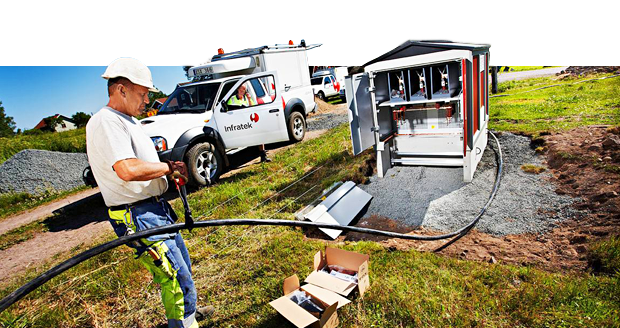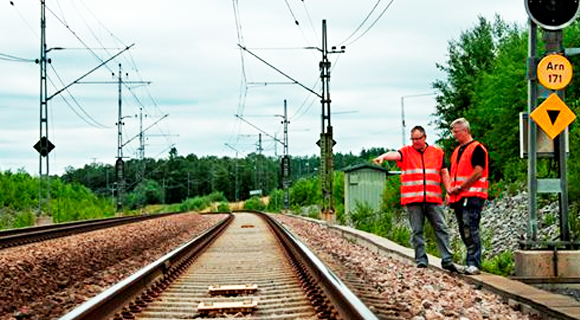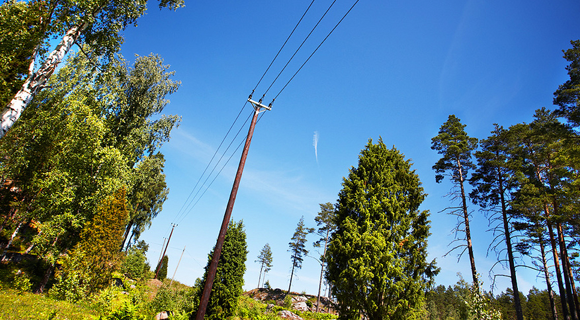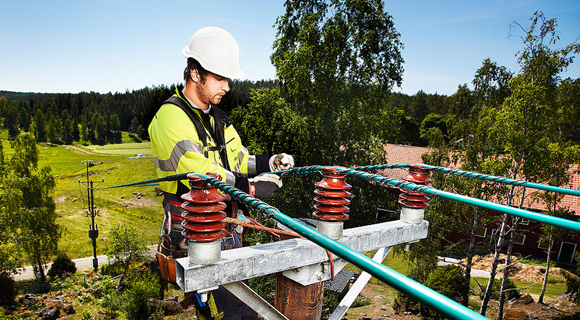Local Infrastructure
During 2012 Local Infrastructure commenced implementation of its strategy for the period 2012–2015 with a sharper focus on specialisation within the various market segments, at the same time as preparing to leverage economies of scale and synergies in order to strengthen the company’s market position.
Distribution grids

Railways and tramways
Street lighting
Fibre-optics/telecoms
District heating
Financial performance 2012
In overall terms Local Infrastructure posted satisfactory results in 2012. The year got off to a good start as a result of high follow-up activities in the wake of the storms that swept across parts of Norway in the week leading up to New Year. With a relatively mild winter, production conditions were also favourable. The Norwegian business enjoyed a good year, returning sound profitability in nearly all divisions, in particular those supplying specialist products or working in alternative markets. The exception was the division in Agder, where measures had to be implemented to establish framework conditions to encourage future profitability.
While there were many encouraging signs in the Swedish business too, there were also a number of significant problems with regard to profitability in the facilities business in the Gothenburg area. Consequently, the subsidiary VEKA was incorporated into Infratek Sverige AB from 1 May, and the business was downscaled to a more appropriate level during autumn. The commencement of the Stockholm Nord railways contract for the Swedish Transport Administration resulted in some start-up costs that will negatively impact results in the short term. At NOK 1,894.1 million (NOK 1,989 million), deliveries within construction, operation and maintenance of local infrastructure contributed 67.4 percent (68.8 percent) of the Group’s sales and were achieved by 1,054 staff (1,120).
|
NOK million
|
2012
|
2011
|
|
Operating revenues
|
1894.1
|
1989.0
|
|
Operating profit before depreciation
|
128.0
|
112.1
|
|
Operating profit
|
103.3
|
86.0
|
|
Operating margin
|
5.5%
|
4.3%
|
Market outlook
Society’s expectations with regard to uptime for critical infrastructure continue to rise, leading to an increase in the quality demanded of the technical installations. Climate challenges and demand for the establishment of a more renewable energy system are also resulting in a need for new generating facilities (primarily wind and heat) and associated infrastructure. This is also resulting in increased focus on public transport and in particular railways and tramways. Exciting technical developments are underway in street lighting, including new and more energy-efficient solutions, and being accompanied by a heightened focus on infrastructure for electrical cars in Norway. Together, these factors are presenting a number of promising opportunities in the majority of Local Infrastructure’s market segments, where customers have been signalling increased investment levels for some time now, even though these are to some extent is being checked by the uncertain global economy.
Based on the framework conditions and the respective sizes of the national markets, Sweden remains the most promising market, despite tough competition and the need for extremely efficient operations in order to achieve the desired profitability. There are also positive signs in the Norwegian market following clarifications regarding the consequences of the Competence Regulation, which has established a degree of certainty regarding framework conditions moving forward. Local Infrastructure currently has no representation in Finland. This market is regarded as the least attractive due to the challenges involved in operating at a profit for companies like Infratek.
With an increased need for expertise and capacity to cater for the expected growth, and generational shifts underway in many of the technical environments, the spin-off of operative businesses and market utilisation will become increasingly relevant. This will open up a number of new opportunities for Infratek in the form of business transfers or acquisitions. These types of opportunities are more often than not politically motivated and require a good understanding of local conditions and a degree of patience to achieve desired positions.
Strategy
The main elements of the strategy for 2012–2015 comprise a continuing concentration on the major distribution companies in the Nordic region and an increasing focus on the railways market and on the major urban areas of Stockholm, Oslo, Gothenburg and Öresund including Malmö. The new strategy will be implemented in stages, where the greatest relative changes are expected to be made within the railways sector.
In 2012 Infratek concentrated on further refining existing business activities by implementing best practice with regard to organisation and process orientation across the entire business area. These initiatives will continue in 2013, when we will also home in on winding down unprofitable operations and processing our largest customers through a newly established KAM organisation. Arrangements are also being put in place to ensure more targeted processing of the rest of the market both politically and through proactive selling. One important prerequisite to achieve these financial ambitions will be to retain Infratek’s strong position with regard to Fortum Distribution in Sweden. This was achieved in 2012 through the winning of main contractor agreements in Stockholm and the west coast of Sweden for the period 2013–2016.






